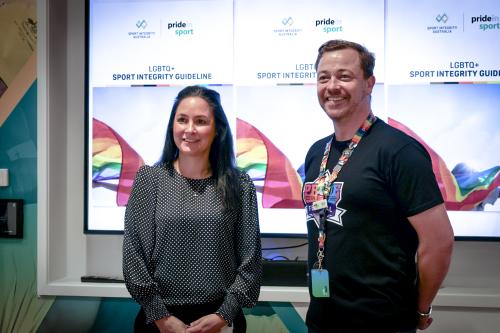Strengthening integrity for the LGBTQ+ community
Ahead of the International Day Against Homophobia, Biphobia and Transphobia (IDAHOBIT Day), Sport Integrity Australia and Pride in Sport have partnered to ensure a more inclusive, safe, and healthy sporting environment for people with diverse sexualities and genders.
The new LGBTQ+ Sport Integrity Guideline provides sporting organisations and decision makers with comprehensive guidance on identifying, managing, and resolving incidents of homophobia, biphobia, and transphobia in sport.
of the new LGBTQ+ Guideline
Sport Integrity Australia CEO Dr Sarah Benson and Pride in Sport Senior Relationship Manager, Ben Cork, launched the new Guideline at an all-staff training session this week.
SIA Acting Deputy CEO – Safety in Sport, Dr Paul Oliver, said addressing these incidents in sport is crucial for creating inclusive and safe environments for everyone, at all levels.
“We want sport to be a safe and welcoming place for all Australians,” Dr Oliver said.
“Creating an inclusive environment leads to better outcomes, including better mental health, greater participation, more enjoyment and even better performance.
“Our hope is that this guideline helps equip sport with practical tools and information to build positive environments, but also to manage any phobic incidents that might occur.”
Sport Integrity Australia has been a proud member of the Australian Pride in Sport program since 2023. Pride in Sport is an ACON Pride Inclusion Program, specifically designed to assist sporting organisations with the inclusion of employees, athletes, coaches, volunteers and spectators with diverse sexualities and genders.
Pride in Sport National Program Manager, Beau Newell, acknowledged that LGBTQ+ participants face significant challenges in feeling accepted in sports settings.
“According to our 2024 Pride in Sport Index National Survey, 53% of respondents have witnessed homophobia, biphobia, or vilification based on identity, and 40% have personally experienced it,” Mr Newell said.
"While participation rates in some sports are high, many young LGBTQ+ athletes also still struggle with acceptance and belonging.
“Initial and ongoing education is essential to create safe and welcoming spaces for all athletes; and that’s what we want to achieve through arming sports with resources like this guideline.”
Key components of the guideline include:
- Detailed examples and indicators of a range of phobic behaviours.
- Information about where these behaviours may sit within sport policies to support complaint management processes.
- An outline of the roles and responsibilities of National Sporting Organisations, National Sporting Organisations for People with Disability and Sport Integrity Australia when it comes to addressing phobic behaviours.
- Education for decision makers such as tribunal members and complaint managers.
- The importance of including those with lived experiences and community members in decision making.
While SIA can manage complaints relating to discrimination in sport, phobic incidents can also fall under a range of prohibited conduct under different policies. This guideline helps readers understand how different types of phobic incidents can be appropriately managed.
“Through addressing these issues, we can move closer to eliminating phobic behaviours in sport and ensuring sport is welcoming for all Australians,” Dr Oliver said.
Download the new guideline here [PDF 2.7 MB]


